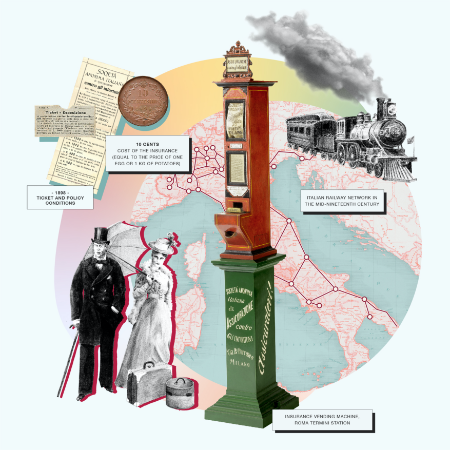For next to nothing, a brilliant idea, the insurance vending machine
From the “Il Mattino” newspaper of Naples,
30th May, 1899
“A brilliant idea.
For next to nothing, my readers, for loose change and no more, for only tent cents, you can take advantage of this brilliant idea: the usual loose change you throw into the slot of an automatic machine will give you - instead of the view of a town you don’t care about, or a mediocre chocolate bar, or a bad-tasting sweet - no less than accident insurance”.
Matilde Serao was certainly not a woman whose pen was dripping with compliments. She was one of the most important authors of the early 1900s. Co-editor of Naples’s “Il Mattino” newspaper and the first woman to found and run a daily newspaper: “Il Giorno”. A writer nominated for the Nobel Prize for Literature several times. Yet, she seemed to lose her head over the insurance vending machine.
Generali participated in the Universal Exhibition in Turin in 1898 with “Società Anonima Italiana di Assicurazione”, showing the world this little tower that automatically distributed insurance, a sort of cash machine or ante litteram self-service ticket machine.
“Loose change - a little click - the ticket appears - you take it - it contains the policy that you hurry to sign, this being your only duty: and you are insured for the journey you’re embarking on, at that moment, on that train, until noon the following day. It’s incredible. So it is. These are eminently practical, brilliant ideas: worthy of appreciation in Naples, as they are appreciated in all the main stations in Italy, and where these tickets are sold, automatically, by the thousands”.
The manufacture of the vending machine was assigned to a company in Milan that specialised in the production of suspended transportation: it was called Ceretti & Tanfani, after the two engineers who founded it. The company had had great success a few years earlier for the creation of a cable car for transporting of people at the United Exhibitions in Milan in 1894.
“And all the practical explanation of the insurance is on the ticket.
At no more than ten cents!”
Matilde Serao
Today everything around us is on demand. Everything is customised.
Every brand, company, and local business promises us a tailor-made product or personalised service perfect for us.
We fill out online forms and customised tailoring is assured.
But this “brilliant idea”, as Matilde Serao calls it, appeared at a time when Italy and Italians were light years away from how we are and how we remember them today.
At the dawn of the new century, in 1899, there were half as many Italians as there are today: 32 million, and half of those 32 million were illiterate.
A skilled worker earned 160 lire per month, and almost half of that went on rent.
In large cities, the streets were electrically lit, but out in the countryside the deepest darkness still reigned at night and there was no running water.
A few years earlier, Guglielmo Marconi had managed to emit radio signals at a distance of a mile, but the radio did not yet exist.
Transport was very difficult, people travelled on horseback, on carts pulled by oxen, or on foot.
The lucky few travelled by sea on steamboats or by land on trains.
The first section of railway was laid in Naples itself, Matilde Serao’s city, in 1839, and joined the city to Portici.
Stations began to come to life as we know them today: Napoli Centrale in 1866, Torino Porta Nuova in 1868, Genova Piazza Principe and Roma Termini in 1870, while state railways had not yet been created; it would be another six years before society saw the light.
And just imagine: in this precarious, almost groundbreaking situation, a little green tower appeared, where anyone could not only buy themselves a ticket but, by inserting a ten-cent coin, could ensure their own safety for the duration of the journey.
“For next to nothing, a brilliant idea” and a futuristic one.
HISTORY

Generali had the foresight to be the first to acquire the technology of a recently founded company, Ceretti & Tanfani in Milan, and install it in the main stations to allow travellers to protect themselves against accidents when travelling. We are looking at the ancestor of the modern vending machine, a small miracle of engineering: a machine that provided a money-back guarantee automatically and instantly, without the need for signatures and red tape. By putting a ten-cent coin into the machine, you obtained a policy that offered the bearer protection against any injuries incurred during the journey by train or steamboat. Linked to the ticket, the policy was valid from the date automatically printed on the ticket until “noon the next day”.
